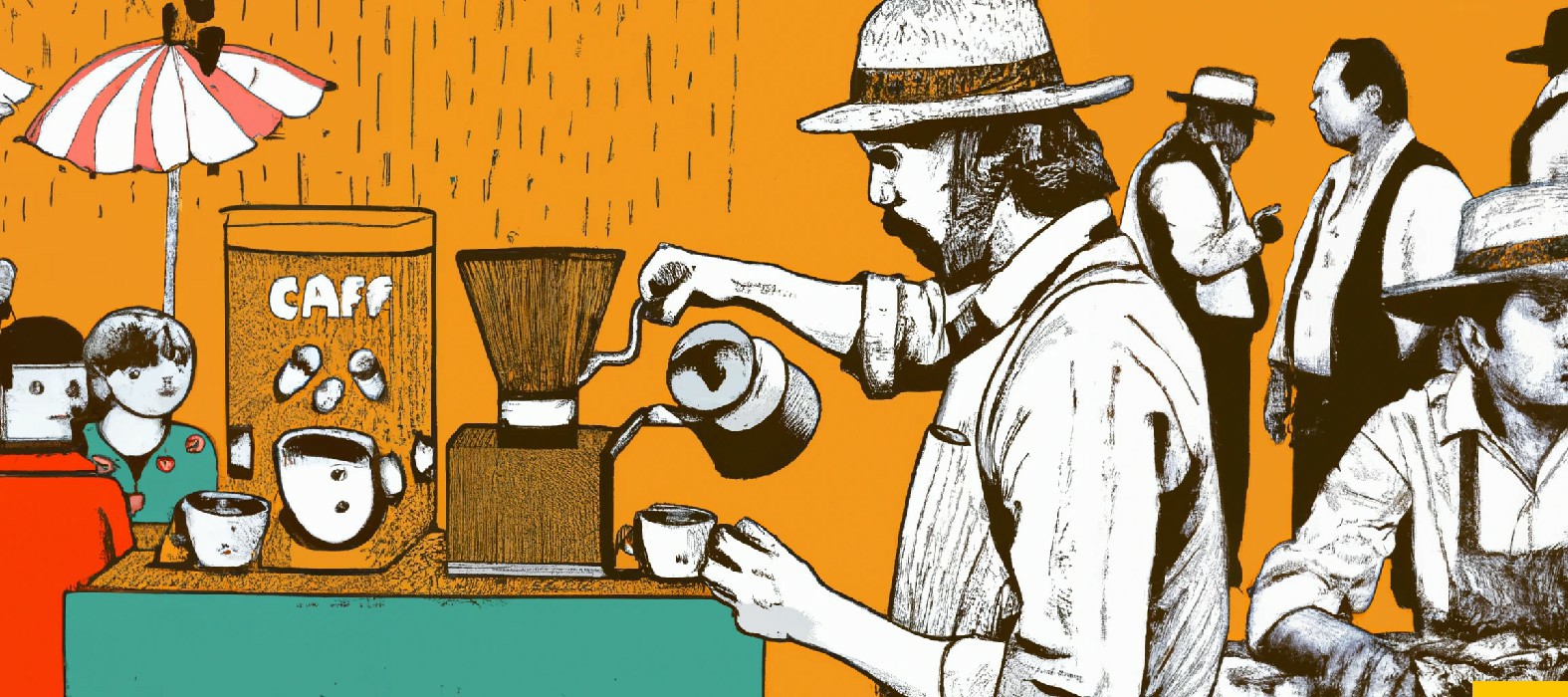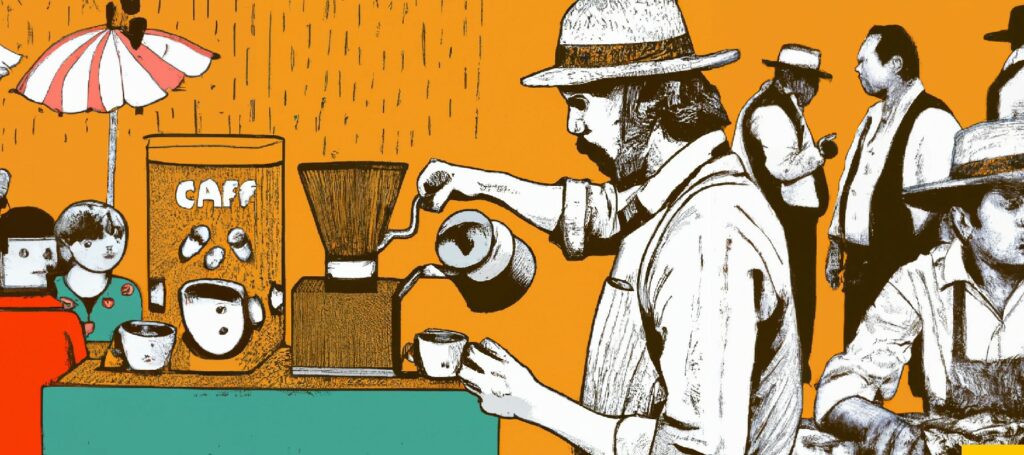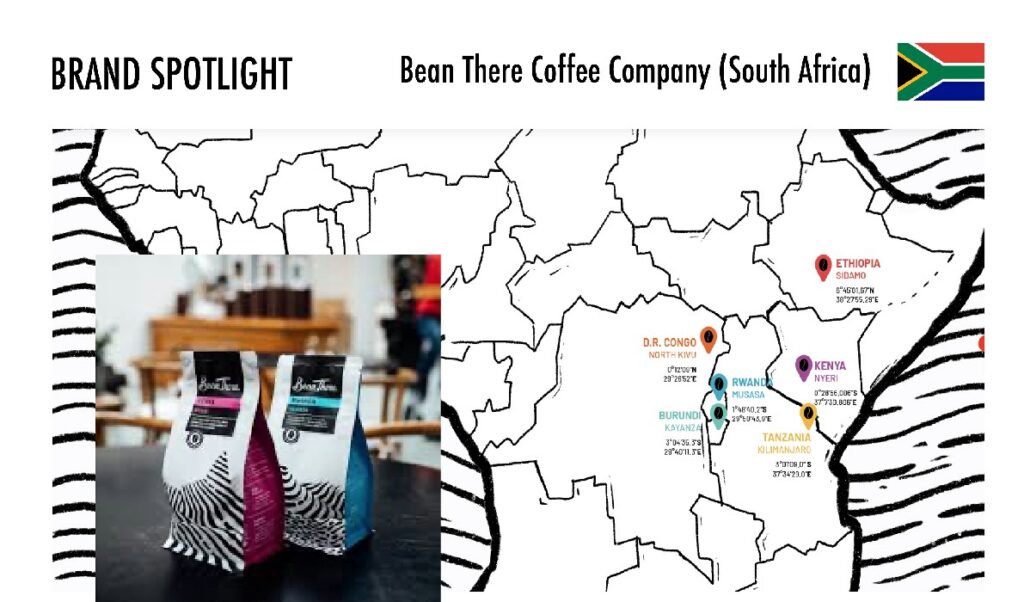
Marketing for Coffee Products: building a lifestyle brand
The coffee industry, a global powerhouse steeped in centuries of tradition, has undergone a dramatic transformation in recent years. With its roots dating back to the 15th century in the Arabian Peninsula, coffee has evolved into a multibillion-dollar industry, captivating the hearts and palates of people worldwide. As we delve into the world of marketing for coffee brands, it is essential to understand the intricacies of the business of espresso and cappuccino and its contemporary landscape.

The Coffee Industry Overview
As the second most traded commodity globally, after oil, coffee beans boasts a complex supply chain that spans continents. From farmers in the coffee belt countries, such as Brazil, Colombia, and Ethiopia, to roasters, retailers, and consumers, the industry is vast and diverse. This rich tapestry of players includes multinational giants like Starbucks and Nestlé, alongside smaller, artisanal roasters and independent cafes run by hip baristas. It is this diversity that makes the coffee market both competitive and exciting.
In recent years, the industry has witnessed a discernible shift towards specialty coffee, as consumers increasingly seek high-quality, ethically sourced beans with distinct flavor profiles. This trend, known as the “Third Wave of Coffee,” has created new opportunities for coffee brands to differentiate themselves and appeal to an ever-growing segment of discerning macchiato and americano drinkers. Lifestyle brands have seized this chance, positioning themselves as purveyors of not just a flat white for busy city-dwellers, but a complete sensory experience that goes beyond the morning caffeine fix.
Sustainability, too, has emerged as a significant trend in the coffee industry, with eco-conscious consumers demanding transparency and ethical practices in every stage of the supply chain. From fair trade and organic certifications to innovative packaging solutions and carbon-neutral roasting, coffee brands have been compelled to adopt sustainable practices to remain competitive in today’s market.
Innovation has become a driving force in the industry, with new brewing methods, flavors, and coffee-based products continually being introduced. From nitro cold brews and coffee-infused cocktails to edible coffee cups and coffee-scented candles, the possibilities for creative marketing for coffee brands seem limitless.

Coffee Industry Trends
The coffee industry is no stranger to change, as it continuously adapts and evolves to meet the needs and desires of a global market. As we examine marketing for coffee brands, it’s crucial to understand the latest trends and innovations shaping the industry. This insight will help brands effectively target their audience and position themselves as leaders in the world of coffee.
Specialty Coffee and Direct Trade:
As mentioned in the previous article, the Third Wave of Coffee movement has created a demand for specialty coffee. This trend focuses on high-quality, single-origin beans with unique flavor profiles, often sourced through direct trade relationships with farmers. This enables coffee brands to establish a deeper connection with the people and places behind their beans, while also ensuring fair compensation for producers.
Eco-Friendliness and Sustainability:
With increasing awareness of environmental issues and the impact of the coffee industry, consumers are seeking brands that prioritize sustainability. This trend has led to an emphasis on eco-friendly practices, such as reducing waste, using biodegradable packaging, and implementing water conservation methods. Coffee brands can further establish themselves as responsible lifestyle brands by promoting their sustainable practices in their marketing campaigns.
Plant-Based and Health-Conscious Offerings:
The rise of plant-based diets and health-conscious consumers has created a demand for alternative milk options, such as almond, oat, and soy. Additionally, there is a growing interest in coffee beverages infused with functional ingredients like collagen, adaptogens, and antioxidants, which cater to the wellness-minded demographic.
Technological Innovations:
The coffee industry has embraced technology to enhance the customer experience and streamline operations. From mobile ordering and payment apps to smart coffee machines and IoT-enabled devices, technology has become an integral part of the coffee world. Brands that leverage these innovations in their marketing strategies can showcase their commitment to providing a seamless, modern experience for their customers.
Experiential Coffee Shops:
The concept of a coffee shop has evolved beyond a simple place to grab a quick cup of joe. Today’s consumers are seeking unique, immersive experiences, making experiential coffee shops a popular trend. These establishments often feature Instagram-worthy interiors, cool baristas and food offerings, and even workshops and classes, further solidifying their position as lifestyle brands.
As the coffee industry continues to evolve, staying informed about the latest trends and adapting marketing strategies accordingly is crucial for success. Brands that effectively embrace these trends and incorporate them into their marketing initiatives will not only stand out in a competitive market but also establish themselves as forward-thinking, innovative lifestyle brands.

Coffee Consumer Behavior
To successfully navigate the world of marketing for coffee brands, it is essential to understand the behavior and preferences of modern coffee consumers. As the industry continues to evolve, so do the tastes and expectations of the people who enjoy their daily cup of java. Here, we explore the key factors that influence coffee consumer behavior and how brands can tailor their marketing strategies to cater to these demands.
Quality and Taste:
The Third Wave of Coffee has heightened the appreciation for high-quality beans and artisanal brewing methods among consumers. Today’s coffee drinkers are more discerning than ever, seeking out unique flavor profiles and engaging in conversations about origin, roast levels, and processing methods. Brands that showcase their commitment to quality and taste through their marketing efforts will attract and retain these discerning consumers.
Convenience and Speed:
Despite their love for gourmet arabica and robusta, modern consumers still value convenience and speed. The rise of mobile ordering, drive-thru services, and single-serve coffee machines cater to this need for on-the-go coffee options. Coffee brands that prioritize and promote their convenient offerings can capture the attention of busy, time-strapped consumers.
Customization:
Personalization is a growing trend across various industries, and coffee is no exception. Consumers are increasingly looking for opportunities to customize their beverages to suit their preferences, from choosing the type of milk to adding flavored syrups and toppings. Brands that offer a wide range of customization options and highlight these choices in their marketing campaigns will appeal to this desire for personalization.

Ethical and Sustainable Practices:
As mentioned earlier, modern coffee consumers are increasingly concerned about the environmental and social impact of their purchases. Brands that communicate their commitment to fair trade, organic farming, and eco-friendly practices in their marketing efforts will resonate with this growing segment of conscious consumers.
Experience and Atmosphere:
In addition to the quality of the brew itself, consumers are also seeking a memorable experience when visiting a coffee shop. This desire for experiential coffee shops, as discussed in the previous article, influences consumer behavior and brand loyalty. Coffee brands that cultivate a unique, inviting atmosphere and share this experience through their marketing channels will attract customers seeking more than just a caffeine fix.
Understanding the behavior and preferences of modern coffee consumers is key to creating marketing strategies that resonate and drive success. By focusing on quality, convenience, customization, sustainability, and experience, coffee brands can appeal to the diverse tastes and expectations of today’s discerning espresso drinkers and solidify their position as leading lifestyle brands.

Coffee Buyer Personas
As we explore marketing for coffee brands, it is crucial to understand the different types of coffee consumers and their unique preferences. By creating buyer personas, brands can develop targeted marketing strategies that resonate with their audience and cultivate loyal customers. In this article, we outline five distinct coffee buyer personas, each with their own preferences and motivations.
The Connoisseur:
This coffee drinker is a true aficionado who appreciates the nuances of different beans, roasts, and brewing methods. They are knowledgeable about coffee origins and often prefer single-origin beans or artisanal blends. To attract the Connoisseur, brands should emphasize their commitment to quality and expertise, highlighting unique flavor profiles and origin stories.
The Social Sipper:
For the Social Sipper, coffee is more than a beverage; it’s an opportunity to connect with friends and colleagues. They are drawn to coffee shops with a welcoming atmosphere and comfortable seating, where they can relax and catch up with others. Brands targeting the Social Sipper should focus on promoting their inviting ambience and diverse menu offerings that cater to groups.
The Busy Bee:
The Busy Bee is always on the go, juggling work, family, and social commitments. Convenience and speed are of utmost importance for this coffee consumer. To appeal to the Busy Bee, brands should highlight their quick service options, such as mobile ordering, drive-thru services, or single-serve coffee pods.
The Eco-Warrior:
This environmentally conscious coffee drinker prioritizes brands that share their commitment to sustainability. They are more likely to choose coffee shops and products that practice fair trade, organic farming, and eco-friendly packaging. Brands targeting the Eco-Warrior should emphasize their sustainable practices and certifications in their marketing campaigns.
The Wellness Enthusiast:
The Wellness Enthusiast seeks coffee options that align with their health-conscious lifestyle. They are drawn to plant-based milk alternatives, functional coffee beverages, and healthy food options. Brands aiming to attract the Wellness Enthusiast should showcase their nutritious offerings and promote any wellness-focused initiatives or partnerships.
By identifying and understanding these coffee buyer personas, brands can create targeted marketing campaigns that effectively cater to their audience’s preferences and motivations. By building meaningful connections with their customers, coffee brands can establish themselves as leading lifestyle brands and foster long-lasting loyalty.

Coffee Innovative Brands:
In the competitive world of arabica and robusta beans and the surrounding industry, innovative brands that challenge the status quo and offer unique experiences stand out. As we delve into marketing for coffee brands, it’s essential to recognize and learn from the trailblazers in the industry. Here, we highlight five innovative coffee brands that have captured the hearts and minds of consumers through their creativity, ingenuity, and vision.
Blue Bottle Coffee:
Founded in 2002, this California-based specialty coffee brand has been a pioneer in the Third Wave Coffee movement. Blue Bottle‘s commitment to freshness and quality, with beans roasted no more than 48 hours before being shipped, has garnered a devoted following. Their minimalist bars, designed to emphasize the coffee-making process, create a unique atmosphere that attracts discerning cappuccino enthusiasts.
Bean There Coffee Company:
This South African coffee brand focuses on offering exceptional single-origin African beans. Bean There sources its beans directly from farmers in countries like Ethiopia, Rwanda, and Burundi, ensuring fair trade practices and social impact. Their commitment to sustainability, ethical sourcing, and showcasing the unique flavors of African coffee has made them a standout brand in the specialty coffee scene.
Onyx Coffee Lab:
This Arkansas-based roastery and coffee shop has garnered a reputation for its meticulous approach to coffee sourcing, roasting, and brewing. With a strong focus on transparency, Onyx Coffee Lab shares detailed information about their beans and the farmers who grow them. Their dedication to quality and innovation has earned them numerous accolades, including multiple Golden Bean awards.
Nespresso:
Nespresso’s single-serve coffee machines and capsules have changed the way people enjoy coffee at home. Their wide range of capsule options, including various blends and flavors, caters to diverse tastes and preferences. Nespresso’s commitment to sustainability, including their recycling program for used capsules, further bolsters their position as an innovative brand in the java space.
Stumptown Coffee Roasters:
With their roots in Portland, Oregon, Stumptown Coffee Roasters has become synonymous with high-quality, artisanal coffee. Their dedication to direct trade relationships and sustainable practices has helped set the standard for the specialty coffee industry. Stumptown’s foray into ready-to-drink cold brew coffee has further solidified their reputation as an innovative and forward-thinking brand.
These innovative coffee brands offer valuable insights for those looking to make their mark in the coffee industry. By embracing creativity, quality, and sustainability, coffee brands can differentiate themselves in a crowded market and establish a strong identity as a leading lifestyle brand.

Marketing Strategies for Coffee Brands
In the ever-evolving world of coffee, it is crucial for brands to develop marketing strategies that captivate audiences and differentiate themselves from competitors. As we conclude our exploration of marketing for coffee brands, we present six marketing strategies, including industry-specific keywords and real-life examples, that can help java businesses establish themselves as innovative lifestyle brands and brew success in the industry.
Tell Your Coffee Brand Story:
A compelling brand story allows you to connect with customers on a deeper level. Share the journey of your beans, from farm to cup, your enthusiasm for roasting, and your commitment to ethical sourcing and sustainability. Use various channels like your website, social media, and promotional materials to communicate your java story and values to your target audience. For example, Bean There Coffee Company shares its direct trade relationships with African farmers and their social impact projects on their website.
Leverage Coffee Influencer Marketing:
Partnering with influencers in the java and lifestyle niches can help you reach new audiences and build credibility. Collaborate with coffee connoisseurs on product reviews, sponsored posts, or even co-created blends to generate buzz and showcase your brand in an authentic, engaging manner. La Colombe Coffee Roasters, for instance, collaborated with Instagram influencer Oh, Ladycakes to create a signature blend.
Create Engaging Coffee Content:
Consistently producing high-quality content related to coffee culture, brewing techniques, and java recipes is essential for establishing your brand as a thought leader in the industry. Develop informative blog posts, captivating videos, and visually appealing social media content that educates and entertains your audience while showcasing your unique latte offerings.
Offer Unique Coffee Experiences:
As previously discussed, experiential coffee shops are a growing trend. Create memorable experiences for your customers by hosting java-related events, workshops, or tastings that align with your brand’s identity. For example, Blue Bottle Coffee offers public cupping sessions where customers can learn about and taste various beans. Promote these events through social media and email marketing campaigns to drive attendance and generate excitement.
Foster a Sense of Coffee Community:
Encourage customer loyalty and engagement by cultivating a sense of community around your java brand. Interact with your audience on social media, create exclusive loyalty programs for your coffee products, and offer personalized experiences to make customers feel valued and connected to your brand.
Utilize Data-Driven Coffee Marketing:
Harness the power of data to create targeted marketing campaigns that resonate with your java-loving audience. Analyze customer behavior, coffee preferences, and demographics to refine your marketing strategies and ensure they align with the needs and desires of your caffeinated aficionados.

By implementing these java-centric marketing strategies with the help of the marketing agency Ikono, coffee brands can forge meaningful connections with their customers and position themselves as innovative lifestyle brands. With a strong marketing foundation in place, coffee businesses can thrive in the competitive landscape and create a loyal following of coffee enthusiasts who appreciate their unique offerings and values.


